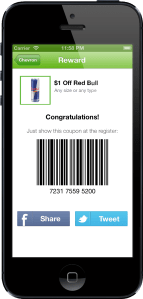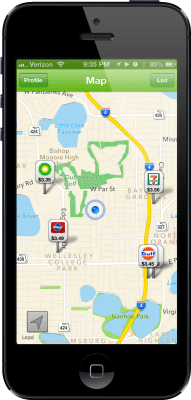Google swooped on Waze earlier this month, shelling out $1.1 billion to acquire the crowdsourced traffic app — indicating there is mileage (and cash) in crowdsourcing-plus-cars. Exactly how much of either remains to be seen but a just launched iOS app, called Fuelzee, reckons there’s enough of both to build a new car-centric community in and around trips to the gas station.
U.S. startup Fuelzee was founded at the end of last year. Its app has just gone live on the App Store, with an Android app due “in the next few weeks”, according to CEO and founder Daniel McGaw. Fuelzee’s aim is to gamify — and simplify — refuelling your vehicle by using a Foursquare-style check-in structure to capture user data and encourage more gas station visits. Check-ins earn badges for people who want to boast about how much fossil fuel they’ve been burning. Badges include the likes of “Oil Tycoon”, “Gas Guzzler”, “Over 9000!”… You get the idea. (Apparently there is no “Immolate” or “Firestarter” badges for using a phone too near the pump however.)
But badges are mere garnish. Fuelzee’s main lure will be gas price data. As with Waze, which uses crowdsourced reports to power its real-time traffic data, Fuelzee is leaning on its users to report real-time gas prices. The incentive for them to do that — beyond helping themselves by helping the whole community of drivers — is that reporting prices earns them points. Which will, in turn, earn rewards such as discount barcode coupons that can be redeemed against branded goods like food and candy.
Discounts on gas may also factor in future but currently Fuelzee’s primary target is secondary purchases such as soft drinks. “We are looking to work mainly with Consumer Packaged Goods companies like Pepsi,” notes McGaw. It also plans to offer local businesses around gas stations the ability to offer discounts, to try to leverage the local spending potential of a Fuelzee community of car owners.
The rewards aspect is not yet launched in the app but is integral to Fuelzee’s offering since it’s the motivator to keep users reporting and using the app. McGaw says rewards “on gas cards and entries into contests” will be landing in the “next coming weeks”.
Another feature — planned for further down the line — is the ability to pay for purchases, whether it’s gas, candy or whatever, in the app itself. “We have future plans to process payments in the app to help save consumer money on gas, and reduce credit card fee’s for gas stations,” says McGaw. “We are working on integration with POS systems over the next few months.”
On the simplification side, the app makes use of the user’s real-time location data to locate the cheapest gas station in their area, plus directions to get there. Social elements are also built in so users can share info on gas prices to Facebook, and also share rewards they have accrued via the service with friends, giving Fuelzee some hooks to reel in more users.
As with any such crowd-powered platform, Fuelzee will only become truly useful if it builds a large enough user-base that’s motivated to keep reporting gas prices (it’s had around 250 beta testers using it for the past two weeks, says McGaw). But, as with Waze, car-centric communities have proved themselves willing to help each other out if it also brings benefits for their own time behind the wheel — so while Fuelzee is only at the start of its journey the potential to turn this app into a powerful data-platform can’t be ruled out. In the mean time it will be hoping the promise of future points-based rewards, and its gas station locator feature, are enough to start pulling the punters in.
Although it’s U.S. only for now, Fuelzee has international expansion on its mind. “We plan to be in Brazil and UK by Spring of 2014,” says McGaw. “We want to be the first international gas app.”
The startup is currently bootstrapped but is in the process of closing a $50,000 seed round, according to McGaw. “We are looking for VC money but need more traction first,” he adds.
Targeting an established community (drivers) to build out a business makes a lot of sense — and distinguishes Fuelzee from Foursquare, which may or may not be suffering from user check-in fatigue. If you can tie check-ins and data reporting tightly back to a particular, rewarded use-case (gas station trips) the value to the user is likely to be more visible and apparent than a catch-all check-in service like Foursquare where the value is necessarily far more diluted. In addition, by concentrating its rewards structure on a type of business that car owners need to keep visiting, Fuelzee creates a natural mechanism to get users firing up its app again.
